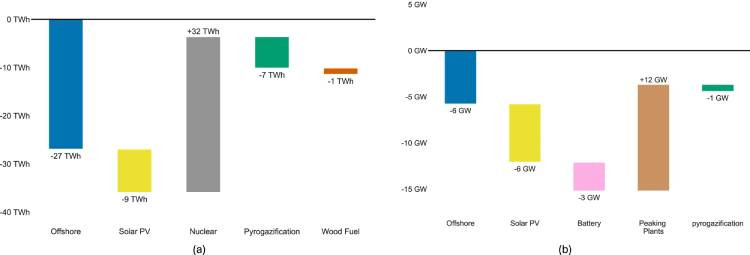EU Ban on Fossil Fuel Boilers: Energy and Climate Impacts
23-01-2025 | By Liam Critchley

Key Things to Know:
- Heat pump adoption, driven by bans on fossil fuel boilers, could reduce primary energy requirements by 12% by 2050, improving overall energy efficiency.
- A Nature Communications study highlights that the additional electricity demand from replacing gas boilers does not adversely affect grid stability, thanks to efficient energy system planning.
- Subsidy frameworks play a critical role in ensuring equitable transitions to low-carbon heating systems, particularly for low-income households.
- Implementing a ban on gas boilers significantly increases the likelihood of achieving carbon neutrality while reducing total system costs in 75% of modelled scenarios.
There is a drive to achieve carbon neutrality in the European residential sector. Achieving these goals will require houses to change their reliance on fossil fuel heating to low-carbon and eco-friendly energy sources―such as solid biomass, electricity and district heating. As it stands, residential space heating covers 17% of the overall heating energy consumption, and around 75% of the heating systems still rely on fossil fuels.
One of the current challenges is that the social cost of carbon in low heating systems is not included in residential energy prices, and this creates a disconnect between the environmental goals of the government and the investment made by homeowners. Homeowner behaviour also varies from person to person, and many might not be the same as the ‘perfect’ consumer in many of the microeconomic models, which could lead to poor investments compared to what is expected.
Without robust policies in place, it’s thought that varying consumer behaviours could promote the overuse of gas-related heating system that will hinder the climate goals of many European nations. With there being a low adoption of low-carbon heating systems across Europe, some nations are considering banning the installation of new fossil fuel boilers altogether. So, the big question is, with the move away from gas to electricity-based energy systems, will this affect the electricity systems around Europe?
EU States are Starting to Ban Fossil Fuel Boilers
Several EU member states have already put bans in place to phase out fossil fuel boilers, but these measures only cover a small part of the total heating consumption in the EU. Regulations that have been introduced are mostly targeting new buildings and putting in place the need for specific fuels (e.g., oil) or granting exemptions. The EU Commission has stated that they are looking to take the regulations further and put a ban in place for all standalone fossil fuel boilers in EU member states from 2029 onwards. This is in part due to the Energy Performance Building Directives requiring EU member states to completely phase out fossil fuel heating (and cooling) by 2040.
The proposed ban aligns with findings in a Nature Communications study, which highlights that shifting from fossil fuel boilers to heat pumps can lead to a 12% reduction in primary energy requirements by 2050. This reduction would also optimise the use of nuclear power and peaking power plants, ensuring a more stable and efficient energy system. Such shifts not only contribute to climate goals but also offer long-term energy cost savings for households, reinforcing the benefits of adopting more stringent regulations.
Visual data from the Nature Communications study further illustrates the profound energy system transformations triggered by the ban. The figure below highlights reductions in primary energy needs and adjustments in installed capacity across the electricity system, underscoring the efficiency gains associated with transitioning to low-carbon heating solutions.

a Primary energy changes (TWh) in 2050 resulting from the implementation of the gas boiler ban. b Additional installed capacity (GW) in 2050 following the gas boiler ban. PV stands for photovoltaic.
New Framework Looks at the Impact of Implementing a Ban on Gas Boilers
It’s been argued by economists that price-based policies are more cost-effective than regulatory approaches as regulatory instruments use uniform requirements that don’t always align with the ideas of each homeowner regarding what’s cost-effective to install in their home. A new study has looked to shed light on the economic side of the debate using mathematical models to see what the cost and energy demand impacts would be on the residential sector if a total ban on gas boilers was put into place in the EU.
This latest study investigated the impacts of introducing the ban in France and modelled the outcomes under 11,664 different scenarios that covered all the potential major uncertainties. The main questions asked by the researchers when choosing to take on this study were:
- To what extent does the ban contribute to achieving carbon neutrality?
- What are its impacts on the energy system, total system costs, and distributional effects?
The modelling framework is used to answer these questions using open-source models from both the energy and residential sectors.
The model simulated endogenous investments in home insulation and heating systems and looked at how each homeowner upgrades their heating system/insulation and how much they are influenced by existing policies and market barriers―such as behavioural anomalies, credit constraints, and hidden costs of energy-efficient technologies. The model also looked at policy mix scenarios, considering factors such as the subsidies available for home insulation and low-carbon heating systems alongside a residential carbon tax of 45 euros per ton of CO2 (€per tCO2).
One notable insight from the study is the pivotal role of subsidies in mitigating the financial burden of transitioning to low-carbon heating systems. By providing targeted incentives for heat pump installations, particularly for low-income households, policymakers can enhance adoption rates and reduce inequalities across demographic groups. Research demonstrates that a well-designed subsidy framework is crucial for achieving equitable outcomes while minimising economic disruptions for vulnerable populations.
The model also looked at the key interactions between the energy system and the residential sector, looking at the increased residential electricity demand on peak power loads if gas boilers were banned and what investments would be required to meet these demands and ensure grid stability. Overall, the framework was designed to capture cross-sectoral interaction between the energy and residential sectors.
The study also revealed that integrating residential energy systems with broader electricity grids could help offset the challenges of peak load demand. By investing in grid enhancements and energy storage solutions, such as battery systems and peaking plants, nations can accommodate the increased electricity demand resulting from widespread heat pump adoption. These measures, as noted in the Nature Communications study, ensure grid stability and prevent disruptions, even during periods of high heating demand in colder months.
Using France as a Case Study
The case study on France looked at how implementing a ban on gas boilers (which, in France, is the same as banning all fossil fuels, as oil boilers have already been banned) could help achieve carbon neutrality. In this case study, the researchers compared two different policy scenarios―one that is based on current policies and one where gas boilers are banned.
11,664 different scenarios―half with the ban and half without―were modelled, and all scenarios were modelled under a carbon budget constraint. The scenarios looked at how the different uncertainties―such as volatile natural gas prices, uncertain electricity demand and uncertain renewable energy capacities―were driving investment dynamics in both the energy and residential sectors. The effects of the ban were evaluated, including how the ban could achieve carbon neutrality targets under different uncertainties while assessing the cost-effectiveness of the ban and the effects under various scenarios.
Another critical finding of the study is the reduced reliance on biogas as a backup energy source. Without the ban, limited biogas supplies could hinder decarbonisation efforts. However, the shift towards heat pumps reduces the dependency on biogas, enabling its strategic allocation to sectors where it is most needed. This realignment, as detailed in the study, exemplifies how regulatory policies can drive more efficient resource utilisation across the energy sector.
There were a number of key discoveries that emerged during the study, including:
- The ban would cause major changes within the energy system that would increase energy efficiency and improve capacity factors for power plants.
- The additional electricity demand due to the ban would not adversely affect the electricity system.
- The ban would likely increase the chance of carbon neutrality being achieved.
- In over 75% of the scenarios, the total system cost would be reduced even with the various uncertainties that could arise.
- Coupled with subsidies, the ban could mitigate inequalities among owner-occupied households, but people in privately rented homes could be negatively affected.
- The distributional impacts are dependent on heat pump subsidies.
Choosing the appropriate policy procedures for low-carbon heating systems is a difficult process because there are a lot of competing criteria that need to be assessed. The framework developed in this study goes beyond the simple models that look at simplified policies like shadow carbon pricing and, therefore, provides more insights into the climate aspects as well. The study showed that banning gas boilers would be justified within the EU, even with there being a number of uncertainties, and the study lays the foundation for further investigations into the impact of banning fossil fuel boilers in other EU countries which have a larger share of fossil fuel boilers―such as Germany or the Netherlands.
Expanding the modelling framework to other EU nations with high fossil fuel dependency, such as Germany and the Netherlands, could reveal additional insights into regional policy adaptations. Tailoring policies to account for local energy infrastructures and economic conditions, as suggested by the Nature Communications study, is essential to maximise the effectiveness of fossil fuel boiler bans and ensure widespread adoption of low-carbon heating technologies.
Reference:

